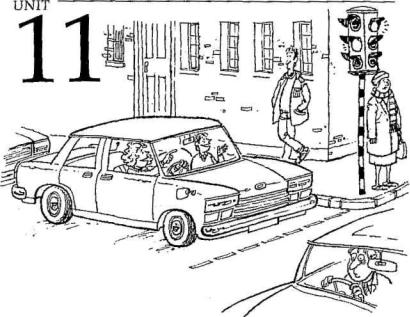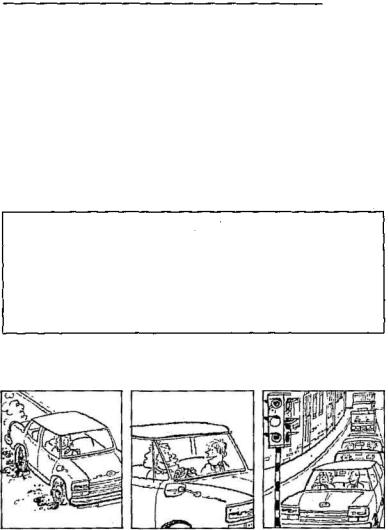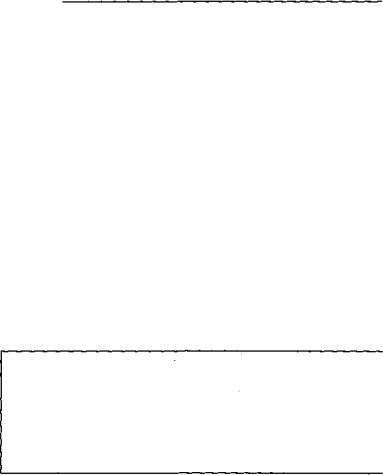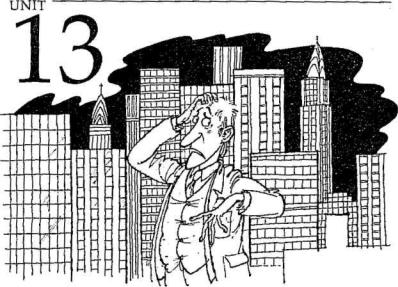
hill_l_a_stories_for_reading_comprehension_1
.pdf
UNIT 10
Exercise 1
Look at these questions. Find the right answers. Then write the questions and the answers:
1 Where did the flood come from?
a) A spring. b) The mountain and hills.
2Where did the water come up from?
a)A lot of the houses. b) The river.
3Who brought food and dry clothes?
a)Men from the Red Cross. b) People on higher ground.
4Is the poor old man's house near a lot of the houses on the low land?
a) No, it is net. b) Yes, it is.
5When did the old man see the flood?
a)In the morning. b) One night.
6Why did the old man go up on to his roof?
a)Because he wanted to look for the men from the Red
Cross. b) Because the water was very high.
7 What did the old man do then?
a) He swam to the higher land. b) He waited.
8Who came then?
a)An old man in a boat. b) Two young men.
9Did the young men want money for the Red Cross?
a)No, they did not. b) Yes, they did.
10What did they want?
a)They wanted to look at the old man. b) They wanted to take the old man to the high ground.
Exercise 2
Write this story. Choose the right words each time:
Our river comes from (a lot of the houses on the low land/the mountain and hills). There was a lot of (rain/sunshine) there in spring, so the river was very (empty/full), and there was a (spring/flood).
31

UNIT 10
Some men came from the (mountain and hills/Red Cross) and took people from the (higher ground/low land) in boats. One poor man lives on the (high/low) ground. His house is (not/very) near ours. One night, (some people/the river) came nearly up to his bedroom window. The old man (swam/went) up to the top of his house. In the end (he/the flood) was on top of his roof. He waited for three hours (in a boat/on his roof), and then two young men (came in a boat/swam to him) and (brought him some money/took him to higher ground). But he was sorry, because he did not (have any money for them/want to go).
Exercise 3
Use much or many in questions (e.g. "Are there many people here?" "Is there much water here?") and in negative statements (e.g. "There aren't many people here." "There isn't much water here.").
Use a lot (of) in affirmative statements (e.g. "There are a lot (of people) here." "There is a lot (of water) here.").
Use much for a thing which we can't count (e.g. water), and many for more than one person, animal or thing that we can count (e.g. women, cats, houses),
Use a lot (of) both for things that we can't count, and for persons, animals and things that we can count.
Use a lot of when a noun follows (e.g. "There are a lot of people here."), and a lot (without of) when a noun does not follow (e.g. "And there are a lot here, too.").
Put a lot, a lot of, many or much in the empty places:
1The old man did not have . . . money, and the Red Cross did not send . . . men.
2"Do you have . . . rain here?" "Yes, we have . . . ." "Oh? We don't have .... "
3There was . . . rain last night.
4"Do ... people live here?" "No, not . . . . "
5There were . . . people in the flood, and . . . on the higher ground.
32

Mrs Walker has one son. His name is Harry. When he was four years old, he had a child's bicycle. It was red and white, and it had small wheels at its sides, so it always stayed up.
Then Harry did not have a bicycle for a long time. Now he is twelve years old, and he wants a bicycle.
Mrs Walker goes to work by car every day, and she takes Harry with her to his school, and brings him back when he finishes. His school is on one side of the town, and Mrs Walker's office is on the other side.
"A lot of my friends have bicycles, and they ride to school on them," Harry said to his mother one day. "Their mothers don't need to take them to school and bring them home again."
But his mother said to him, "Wait, Harry. Your father and I are going to buy you a nice bicycle soon."
Then yesterday Mrs Walker stopped her car at a red light and looked at Harry. "Harry," she said to him, "your father and I are going to give you a bicycle next month, but first I'm going to ask you some questions. Now, look at those traffic lights. Do you know their meaning?"
"Oh, yes, I do!" Harry answered happily. "Red is 'Stop', green is 'Go', and yellow is 'Go very quickly.' "
33

UNIT 11
Exercise 1
Look at these questions. Find the right answers. Then write the questions and the answers:
1Is Harry a boy, or a man?
a)He is a boy. b) He is a man.
2Has his mother got a car?
a)No, she has not. b) Yes, she has.
3Has she got a job?
a)No, she has not. b) Yes, she has.
4Is Harry's school near her office?
a) No, it is not. b) Yes, it is.
5Has Harry got a bicycle now?
a)No, he has not. b) Yes, he has.
6What does he want?
a)A bicycle. b) A car.
7What do a lot of his friends do?
a)They drive to school in their cars. b) They ride to school on their bicycles.
8Where did Mrs Walker stop her car yesterday?
a) At a bicycle shop. b) At some traffic lights.
9What did she ask Harry then?
a)The meaning of her questions. b) The meaning of the traffic lights.
10Did Harry know the right meaning of the yellow light?
a)No, he did not. b) Yes, he did.
Exercise 2
Write this story. Choose the right words each time:
Mrs Walker is Harry's (daughter/mother). First Harry had (a small bicycle/some small wheels), but then he did not have (any/one). Now he goes to his (office/school) in (his/his mother's) car every day, but he wants to go by (biajcle/bus). A lot of other
34

UNIT 11
boys have (bicycles/airs), so their mothers (do not take/take) them to school. Harry's mother (did not need/needed) to take Harry to school, because he (did not have/had) a bicycle, but then she wanted to buy one for (him/his father). But first (he/she) asked (her/him) a question about traffic lights, and (her/his) answers were (all/not all) right, because the meaning of yellow (is/is not) 'Go very quickly'.
Exercise 3
We use he/him/his when we are writing about a man or a boy, she/her when we are writing about a woman or a girl, and it/its when we are writing about an animal or a thing, We use they/them/their when we are writing about more than one person, animal or thing.
We use he/she/it/they for the subject, him/her/it/them for the object, and his/her/its/their to show possession.
Put he, him, his, it, its, she, her, they, them or their in the empty places:
1 This is Mrs Walker. . . . is in
. . . car. . . . is blue. . . . wheels are dirty.
2 Mrs Walker has one son. . . .name is Harry. . . . goes to school. . . .
mother takes him there. Harry is talking to . . . .
3 These are traffic lights. . . . are red now, Harry is looking at . . . .
There are a lot of cars here. . . .
drivers are waiting.
35

Harold Scott sold cheap shoes. He had a small lorry, and he bought the shoes from the factory and took them from one house to another and tried to sell them to people.
He sold a lot of his shoes in small villages, because there were not many shops there, and people did not want to go to the town and buy their shoes there.
One day Harold drove along the street of a village and stopped in front of one of the houses. There was a small boy beside the door. Harold opened the window of his lorry and called to the boy, "Hello. Is your mother at home?"
The boy looked at him. Then he answered, "Yes, she is." "That's good," Harold said, and he smiled. He got out of his lorry, took some shoes from the back and went to the door of the house. He knocked at the door and then he waited, but the
door did not open.
After a minute, Harold knocked at the door again and waited for two minutes, but again the door did not open.
Then Harold looked at the small boy and said in an angry voice, "Your mother is not at home."
"She is," the small boy answered.
"Then why hasn't she opened the door?" Harold asked. "Because this isn't my house," the small boy answered.
36

UNIT 12
Exercise 1
Look at these questions. Find the right answers. Then write the questions and the answers:
1What did Harold do with his lorry?
a)He carried his shoes in it. b) He took things from houses in it.
2Who bought a lot of his shoes?
a) |
People |
in shops. |
b) People in small villages. |
c) |
People |
in the town. |
|
3 What did Harold see in front of one house in a village? a) A lorry. b) A small boy.
4What did Harold do to the boy?
a)He called to him. b) He took him in his lorry.
5Why did Harold take some shoes out of his lorry then?
a)Because he wanted to sell them to the boy. b) Because he wanted to sell them to the boy's mother.
6Did the boy's mother open the door?
a)No, she did not. b) Yes, she did.
7What did Harold do then?
a)He knocked again. b) He opened the door.
8Was he happy then?
a)No, he was not. b) Yes, he was.
9Was the boy's mother in the house?
a)No, she was not. b) Yes, she was.
10Why?
a)Because she was at the shops. b) Because it was not her house.
37

UNIT 12
Exercise 2
Write this story. Choose the right words each time:
Harold Scott (did not make shoes, but he/made shoes in a factory and) brought them to people's houses in a lorry. People in (the town/villages) bought a lot of his shoes, because (there were not many shops/they did not want to buy shoes) there. One day Harold was in (his lorry/one of the houses) in a village. He saw a small boy near a (door/window). He opened (his window/it) and (smiled at/spoke to) the boy. Harold was (happy/sad) because the boy's mother was (at home/out). He wanted to sell her (his lorry/some of his shoes). He knocked at the (back/door) of the house, (and/but) the boy's mother (did not open/opened) it. Harold (looked at/spoke to) the boy angrily then, but the boy was (right/wrong): his mother (was/was not) at home, but her home (was/was not) that house.
Exercise 3
For a, an and some, see Unit 1. We use the instead of a, an or some when we refer back to something or someone that we have already mentioned. When we read, "This is a pen, and that is a pencil. The pen is black, and the pencil is red.", we know in the second sentence which pen and pencil the person is writing about — the ones he has written about in the first sentence.
Put a, an, some or the in each empty place:
Harold had . . . lorry. . . . lorry was quite small. Last Monday he took . . . money out of his bank and bought. . . shoes with it. He took . . . shoes to . . . village. He sold them in . . . village in ... hour, and got a lot of money. Then he bought ... more shoes with ... money, and he bought ... food for his family too. He has ... wife and ... eleven-year-old daughter.
38

Dick lived in England. In January he said to his wife, "I'm going to fly to New York next week, because I've got some work there."
"Where are you going to stay there?" his wife asked. "I don't know yet," Dick answered.
"Please send me your address from there in a telegram," his wife said.
"All right," Dick answered.
He flew to New York on January 31st and found a nice hotel in the centre of the city. He put his things in his room and then he sent his wife a telegram. He put the address of his hotel in it.
In the evening he did not have any work, so he went to a cinema. He came out at nine o'clock and said, "Now I'm going to go back to my hotel and have a nice dinner."
He found a taxi, and the driver said, "Where do you want to go?" But Dick did not remember the name and address of his hotel.
"Which hotel are my things in?" he said. "And what am I going to do tonight?" But the driver of the taxi did not know, so Dick got out and went into a telegraph office. There he sent his wife another telegram, and in it he wrote, "Please send me my address at this telegraph office."
39

UNIT 13
Exercise 1
Look at these questions. Find the right answers. Then write the questions and the answers:
1Why did Dick fly to New York?
a)Because his home was there. b) Because he had work there.
2Why did his wife want a telegram from him?
a)Because he did not know his address yet. b) Because she wanted to go to New York too.
3Where did Dick stay in New York?
a) With a friend in the centre of the city. b) In a hotel.
4Did he remember to send his wife a telegram?
a)No, he did not. b) Yes, he did.
5Did he work that evening?
a) Yes, in a cinema. b) No, he did not.
6Where did he want to go at nine o'clock?
a)To a cinema. b) To his hotel.
7Did he want to walk to it?
a)No, he wanted to go in a taxi. b) Yes, he did.
8What did the driver of the taxi want to know?
a)The name and address of a telegraph office. b) The name and address of Dick's hotel.
9Did Dick tell him?
a)No, he did not. b) Yes, he did.
10Who sent him the name and address of his hotel?
a)A telegraph office. b) His wife.
Exercise 2
Write this story. Choose the right words each time:
Dick's home was in (England/New York). He went (there/to New York) in January. He (did not know/knew) his address there, and his wife (asked for it/knew it as well). Dick went to New York in
40
